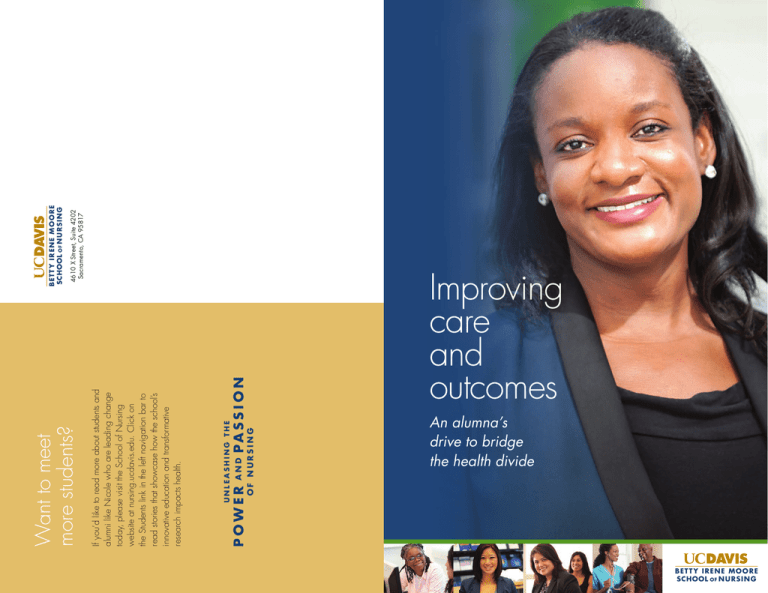Improving care and outcomes
advertisement

PA S S I O N AND OF NURSING POWER UNLEASHING THE If you’d like to read more about students and alumni like Nicole who are leading change today, please visit the School of Nursing website at nursing.ucdavis.edu. Click on the Students link in the left navigation bar to read stories that showcase how the school’s innovative education and transformative research impacts health. Want to meet more students? 4610 X Street, Suite 4202 Sacramento, CA 95817 BET T Y IRENE MOORE SCHOOL OF NURSIN G Improving care and outcomes An alumna’s drive to bridge the health divide BET T Y IRENE MOORE SCHOOL OF NURSIN G born in the United States are more than twice as likely as white infants to die within the first year. So, an alumna of the Betty Irene Moore School of Nursing at UC Davis dedicates her career to bridging the divide. “When I realized it was a national crisis, I thought, what can I do to help improve this?” said Nicole Smith, a public health nurse who, in 2015, earned her master’s degree in Nursing Science and Health-Care Leadership. “My desire for social justice drove me to investigate the issue further.” Disparities in health care stem from a racial division that begins at birth and can have a significant effect on the future of infants. For her thesis, Smith interviewed health care providers toward minority women were not to glean their knowledge of health overt, rather based on biases and disparities and discover if providers lack of understanding. Her research tailor care to those they serve. sparked two questions: How might “What struck me was participants racism contribute to biological felt that social factors superseded reactions in a woman’s body during biological factors as contributors to pregnancy, including infant mortality,” Smith increased stress? How explained. “I didn’t “We cannot be might those hormones initially ask participants comfortable damage a woman’s about how racism with the status organs and influence impacts infant mortality, quo. We cannot the growth of her baby? but the providers I spoke “I hope that health with believe it plays shy away care organizations will a major role in why from critically not ignore the elephant we’re seeing disparities examining both in the room and that lead to negative the systems recognize that racism outcomes.” at large and is an issue and needs Smith said ourselves, to be addressed,” interviewees suggested because we Smith said. “When you providers’ actions A F R I C A N-A M E R IC A N BABI ES create the systems.” —Nicole Smith, alumna of the Betty Irene Moore School of Nursing Nicole Smith, a 2015 alumna of the master’s-degree leadership program, learned key skills to advance her career and confidently lead in practice. understand a culture different than yours, it makes you a better and more effective health care provider.” Smith continues her research and asking questions in her role as nurse manager for the Alameda County Public Health Department’s NurseFamily Partnership Program. Halfway through her master’s-degree program, she was promoted to nurse manager, where she immediately began putting her classroom education into practice. “I implement team-building exercises, solicit feedback from my team and support their needs. These skills may not have come naturally for me before the graduate program,” Smith said. “The School of Nursing provided me with the tools and skills to do that confidently.” Smith credits the Community Connections Course, fieldwork that spans three quarters during the first year of the master’s-degree leadership program, with pushing students to encounter cultural diversity and foster inclusiveness when developing solutions for community organizations. The experience, she said, generated discomfort among some of her classmates, and resulted in personal growth. “I think we have to get a little uncomfortable in order to self-reflect and consider options from another’s perspectives,” Smith explained. “We cannot be comfortable with the status quo. We cannot shy away from critically examining both the systems at large and ourselves, because we create the systems.” Smith’s School of Nursing education prompted her to speak in public, investigate what makes leaders successful and work to be more collaborative in her practice. She also leverages her UC Davis experience to encourage other nurses into leadership positions and nurture her professional growth. to share this or contact us with any comments or questions. We welcome your feedback. For more information, visit nursing.ucdavis.edu or contact the School of Nursing at 916-734-2145 or at BettyIreneMooreSON@ucdmc.ucdavis.edu. P L E AS E F E E L F RE E

